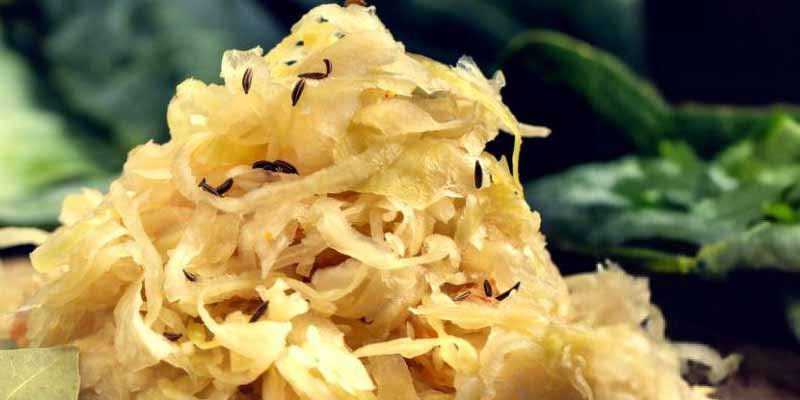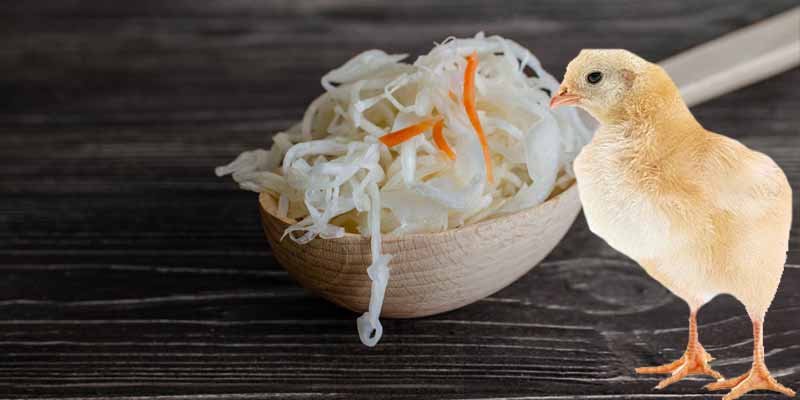Can Chickens Eat Sauerkraut? A Definite Solution
Published: 9 Oct 2024
Chickens can eat food that has adequate nutrients with zero or negligible risks. Sauerkraut is a product of cabbage and carries some healthy nutrients which are supportive of chicken’s growth and development. There are a few risks or concerns with feeding Sauerkraut to backyard chickens that can be managed with some precautionary steps. So, yes chickens can have Sauerkraut in moderation with some caution. The article will unravel the ins and outs of Sauerkraut to provide a clear view to chicken keepers.

Can Chickens Eat Sauerkraut? A Definite Guide
What is Sauerkraut?
Sauerkraut is made by fermenting cabbage. It is native to central or Eastern Europe. During the fermentation process, salt is being added to it. Sauerkraut carries a tangy flavor due to the growth of bacteria while it’s fermenting. This bacteria is beneficial for chicken’s health.
Is Sauerkraut Safe for Chickens?
Yes, Sauerkraut is a safe and healthy diet if incorporated in a limited portion of the primary diet of chickens. It contains salts which can lead to adverse effects for the flock. Excessive use of Sauerkraut is not safe and therefore not recommended for our backyard chickens. So, follow the simple cautionary steps mentioned below to make Sauerkraut safe for chickens.
How to Introduce Sauerkraut into a Chicken’s Diet?
It is crucial to understand the preparation and feeding techniques of Sauerkraut. We will discuss simple steps that ensure the safety and growth of chickens. So, prepare Sauerkraut as:
- Choose Fresh Sauerkraut: The first thing is not to serve pasteurized or preserved Sauerkraut to your flock. Go for the fresh Sauerkraut.
- Rinse Fresh Sauerkraut: After selecting the fresh Sauerkraut, now wash them under running water. It will reduce the sodium levels in Sauerkraut.
- Cut them into Small Pieces: We have always suggested that flock keepers serve food to their chickens in small and manageable pieces. So, do it.
- Introduce Sauerkraut Gradually: In the initial stage, offer Sauerkraut to chickens in small portions and let them get familiarized with its taste.
- Mix Sauerkraut with Routine Diet: To make our flock happy and healthy, it is good to mix Sauerkraut with their routine diet. It will build their trust.
- Observe their Reaction: After serving fresh, decontaminated, and chopped pieces of Sauerkraut to the flock, carefully look for their response.
- Frequency and Volume: Sauerkraut is not the primary source of nutrients for your flock. So, keep its volume to a minimum level. Weakly routine is enough.
- Consult a Veterinarian: If you notice any adverse response from your flock, immediately contact your nearby veterinarian for a physical visit.
Is Sauerkraut a High Salty Food?
Yes, Sauerkraut contains a high value of salt which is not favorable for chickens. The additional salt is used to preserve and ferment cabbage. The rinsing process will have a positive impact on reducing the sodium level of Sauerkraut. We have advised you to serve Sauerkraut occasionally in limited volume for its high sodium potency. So, keep it to a minimum portion.
Do Chickens Like Sauerkraut?
Yes, chickens love to peck at Sauerkraut. It provides tangy flavor and crunchy texture which are luring for the flock. There might be exceptional cases where some chickens show a lack of interest in consuming Sauerkraut.

Nutritional Profile of Sauerkraut
We all know that cabbage is packed with healthy nutrients for chickens. Sauerkraut is a fermented form of cabbage and therefore provides a good amount of nutritional value to chickens. Here is a list of its key nutrients:
- Vitamins: Sauerkraut offers a good range of vitamins like Vitamin A and K. These vitamins are supportive of boosting immunity and bone strength.
- Minerals: Two very important minerals iron and calcium are available in Sauerkraut. These are good for metabolic performance and muscle functioning.
- Fiber Content: Poultry owners are looking for fiber fiber-rich diet for their flock because it aids in the digestion process of chickens. Sauerkraut has dietary fiber.
- Probiotics: The fermentation of cabbage produces bacteria helpful for chickens. The bacteria is beneficial for the digestion and gut health of the flock.
- Antioxidants: Antioxidants are good for supporting the overall health of chickens. Sauerkraut has anti-inflammatory antioxidants.
- Low-Calorie Diet: Sauerkraut is a low-calorie diet which is good for weight balance in chickens. Obesity is not feasible for a healthy backyard flock.
How Often Can Chickens Have Sauerkraut?
Sauerkraut is recommended as an occasional diet for chickens. Overfeeding of Sauerkraut will lead to adverse outcomes for our flock. So, we have to contain its portion under 10% of the total diet of chickens. It is not advised to serve Sauerkraut to chickens every day. We suggest making a weakly schedule of Sauerkraut for your flock. It will prevent the nutritional imbalance in chickens.
Can Baby Chicks Have Sauerkraut?
No, we are not recommending you to serve Sauerkraut to baby chickens. Chicks with immature digestive mechanisms could not afford to consume a salty diet. Additionally, the little champs require a well-balanced nutritious diet for their optimal and healthy growth. So, we suggest you offer the commercially available starter diet to baby chickens.

Can Chickens Eat Raw Sauerkraut?
Yes, chickens can have raw Sauerkraut in moderation. Raw Sauerkraut is good for gut health as it offers probiotics t chickens. Always follow the preparation guidelines mentioned above to ensure the safety of your flock. The use of additives and spices is not recommended for chickens. So, serve fresh, decontaminated, chopped, and plain Sauerkraut to your flock.
Can Chickens Eat Cooked Sauerkraut?
Yes, chickens have no issues with cooked Sauerkraut. The cooking process will reduce the amount of probiotics offered by raw Sauerkraut. As we have already discussed these probiotics are supportive of gut health in chickens. If you want to serve cooked Sauerkraut to chickens then it should be plain and free from additional spices.
Can Chickens Eat Fermented Sauerkraut?
Yes, fermented Sauerkraut is safe and healthy for chickens in limited quantity. You have to minimize the addition of sodium or salt into it. Additionally, incorporate fermented Sauerkraut in a small portion of the total diet of chickens.
Can Chickens Eat Canned Sauerkraut?
We are in favor of canned Sauerkraut for our flock. The canned variety of Sauerkraut is found with a high volume of sodium and other spices which are harmful to the overall growth of chickens. Instead, we prefer homemade Sauerkraut with organic formulation. If plain Sauerkraut with zero sodium value is available then you can serve it to your chickens in moderation.
What Are the Benefits of Feeding Sauerkraut to Chickens?
After analyzing the nutritional profile of Sauerkraut, we can estimate its potential benefits for chickens. Here is a list of some common healthy effects of Sauerkraut on chicken’s health:
- Sauerkraut promotes the gut health and supports the digestive process.
- It boosts the immune system in chickens.
- It is good for bone health in chickens.
- It reduces inflammation and oxidative stress in chickens.
- It appeals to chickens because of its tangy flavor and crunchy texture.
- It can form blood clotting in chickens.
- Sauerkraut improves the hydration level in chicken.
- It is a good source to diversify the diet of chickens.
What are the Risks of Feeding Sauerkraut to Chickens?
With its positive effects, there are some concerns for our fellow chicken keepers. We have determined that Sauerkraut contains high levels of salt which is not a healthy contributor to chicken’s health. Here are some common concerns with feeding of Sauerkraut to the flock:
- Sauerkraut can cause dehydration issues which cause kidney failure.
- There is a risk of digestive upset that leads to diarrhea.
- Excessive intake of Sauerkraut can cause nutritional imbalance.
- Spoiled Sauerkraut can be a risk for chickens with food illness.
- Some breeds can show allergic reactions to Sauerkraut.
Signs of Digestive Issues in Chickens?
- Diarrhea: Loose droppings in chickens indicate a digestive disorder.
- Lethargic Behavior: Your flock will go passive and have zero physical activity.
- Lack of Appetite: Chickens having digestive upset will show a lack of interest in diet.
- Bloating: You can identify the digestive disturbance by a swollen abdomen.
- Dropping Color: Green or yellow droppings are the signs of digestive upset.
- Feather Ruffling: Fluffing of feathers by chickens indicates unusual behavior.
- Weight Loss: Weakness is a dominant sign of digestive disorder.
- Change of Vocal: An increase in vocalization or signs of distress show their irritability.
What Types of Sauerkraut Can Chickens Eat?
Chicken can easily consume Sauerkraut in various formats considering some basic cautionary steps:
- Plain Sauerkraut: Chickens can safely consume plain Sauerkraut without preservatives and spices.
- Minimum Sodium Level: High level of sodium is the major drawback of Sauerkraut. So, chickens can have only low sodium Sauerkraut in moderation.
- Homemade Sauerkraut: We prefer Sauerkraut prepared at home that is according to the health guidelines for chickens (fresh & plain).
- Unpasteurized Sauerkraut: It is good for chicken’s digestive mechanism. It produces helpful bacteria that improve gut health in chickens.
- Organic Sauerkraut: Organically cultivated cabbage is safer and healthier choice for chickens. It should be free from pesticide-negative effects.
Alternatives to Sauerkraut for Chickens
If you are not satisfied with the nutritional value or worried about the risks involved with serving Sauerkraut to your flock then consider these foods:
- Plain Yogurt: A small quantity of plain yogurt will provide a good amount of probiotics to favor the gut health of chickens.
- Leafy Greens: There is a wide range of leafy greens that provide nutritional benefits to chickens. Spinach, Kale, and Lettuce are famous.
- Pumpkin: Pumpkin is very famous amongst poultry owners for its nutrient-rich profile. It offers vitamins and fiber content good for chickens.
- Carrots: Carrots are a good source of vitamins with their crunchy texture. You can serve chopped carrots to chickens in small amounts.
- Cabbage: Sauerkraut is fermented cabbage but you can serve fresh cabbage to your flock. There is no risk of high salt intake and digestive upset.
- Beet Greens: Beet greens are a nutrient-rich and safer option for chickens. They can be served in raw or cooked form in limited portions.
- Fruits: There are juicy sweet fruits that are loved by chickens. Seedless apples, Black olives, persimmons, figs and strawberries are loved by chicken enthusiasts.
Conclusion
After exploring the ins and outs of Sauerkraut, we have concluded that chickens can have Sauerkraut in small amounts. Sauerkraut offers probiotics and other healthy nutrients to chickens. Through its properties, it is with (beneficial bacteria) good for the digestive system of chickens.
The high volume of salt is a major concern for chickens. The additives and spices added during fermentation can lead to disastrous outcomes. To err on the safer side we suggest serving plain Sauerkraut to your flock. It is safe for chickens to prepare Sauerkraut organically at home and avoid canned varieties.

- Be Respectful
- Stay Relevant
- Stay Positive
- True Feedback
- Encourage Discussion
- Avoid Spamming
- No Fake News
- Don't Copy-Paste
- No Personal Attacks

- Be Respectful
- Stay Relevant
- Stay Positive
- True Feedback
- Encourage Discussion
- Avoid Spamming
- No Fake News
- Don't Copy-Paste
- No Personal Attacks


